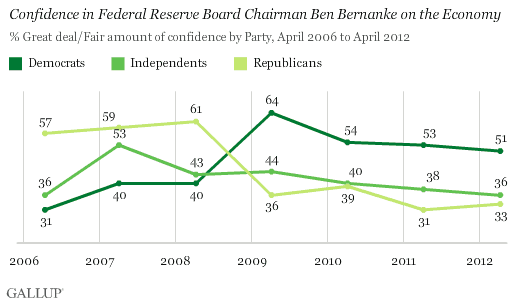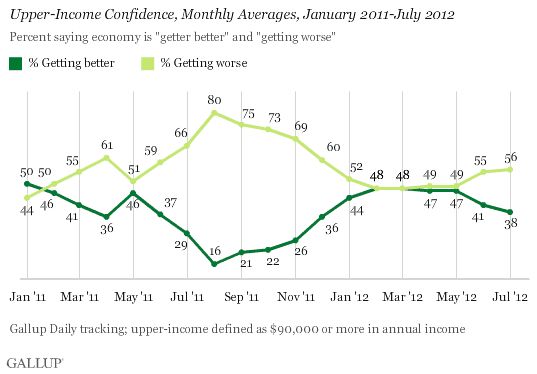A major stealth issue to watch for at the Republican Convention is how key Republicans talk about the Fed's independence. Ben Bernanke is relatively unpopular as chairman of the Federal Reserve. In 2001, 74% of Americans expressed confidence in former Chairman Alan Greenspan to do the right thing for the economy. In 2012, only 34% of Americans express the same level of confidence in Chairman Ben Bernanke while -- for the first time since Gallup began tracking in 2001 -- more Americans (46%) say they have only a little confidence or almost none in Bernanke. This lack of confidence in the chairman of the Federal Reserve reflects the increasing political risk facing the Fed's continued independence.

About half of Democrats express confidence in Bernanke while only about one-third of independents and Republicans do.

The financial crisis and the associated extraordinary actions of the Fed have greatly changed the public perception of the Fed. At the same time, Ron Paul -- a strong proponent of reining in the Fed --gained much added support for his long-held views during the Republican presidential nominating process.
Most importantly, the Fed faces some key choices at its Sept. 12-13 meeting that could influence the economy, the election, and the future independence of the Fed. Given the FOMC (Federal Open Market Committee) minutes of their most recent meeting, released last week, it seems the financial markets expect the Fed to flood the economy with more money when it meets -- that is to implement so-called quantitative easing (QE3).
Whether more money is necessary or helpful to the U.S. economy right now is debatable. Money flow doesn't seem to be the problem holding back job creation. However, more money would continue to support commodity prices and the stock market -- both of which impact economic confidence. At the same time, the higher food and gas prices often associated with more money in the economy could worsen the current economic slowdown.
Politically, the situation is very difficult. If the Fed goes ahead with QE3, Republicans might see it as not only unnecessary, but a sign that the Fed continues on a reckless monetary path. If the Fed doesn't implement QE3, the markets expectations will not be met and the markets could drop significantly. In turn, economic confidence -- particularly of upper-income Americans -- could also worsen, hurting the economy, and leaving Democrats to see the Fed as potentially sabotaging the presidential elections with a September surprise.

Given the composition of the FOMC, my guess is that the Fed will announce at its September meeting that it plans to implement QE3 based on FOMC member perceptions that high unemployment and the weak global economy justifies such an extraordinary effort. In this context, it is worth watching how the Republicans talk about the Fed and its current policy decisions during their convention. How the Fed acts between now and the election -- and how it justifies any action it does or does not take -- could have more impact on its future independence than on the near term future of the U.S. economy.
